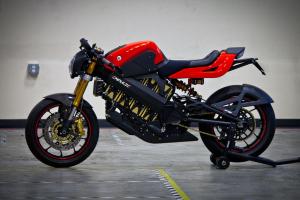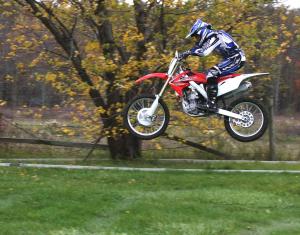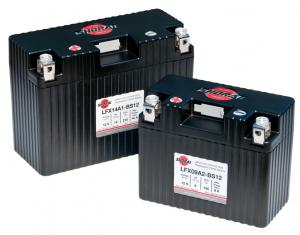Motorsports Racing News & Blog Articles
Church of MO: Best Of 2011 Awards
If it’s Thanksgiving it must be time for the tryptophan to kick in, along with MO’s highly coveted Motorcycle of the Year awards. Why not take a moment, as we rush headfirst into 2022, to reflect on all the bikes that took home the trophies ten years ago, the class of 2011.
Some of the best motorcycles ever built
Motorcycle of the Year
BMW K1600GT/GTL
BMW’s new K1600 platform is nothing less than impressive, whether discussing its marvelous inline-Six motor, its lengthy list of technologically advanced features, or its beguiling sporting performance for a comfy touring mount of its size. And, amazingly, the K16’s underpinnings give it the ability to compete simultaneously with luxury-touring bikes and serious sporty tourers. The K16GT was judged to be the best sport-touring bike in a comparo with Kawasaki’s Concours 14, while the slightly more relaxed K16GTL made Honda’s Gold Wing shake in its heavier, well-worn boots in this comparison.
The K1600s are most notable for their sensational inline-Six engines, the 1645cc powerplant proving to have an incredibly deep well of power while being uncannily smooth. The motorcycle world hasn’t seen an I-Six since the early 1980s, and BMW has used advanced architecture and a relatively small bore size to create an engine much narrower than a Honda CBX or Kawasaki K1300, allowing for the steeper lean angles its stiff aluminum frame allows. As a bonus, it has what is perhaps the sweetest exhaust note of any production motorcycle.
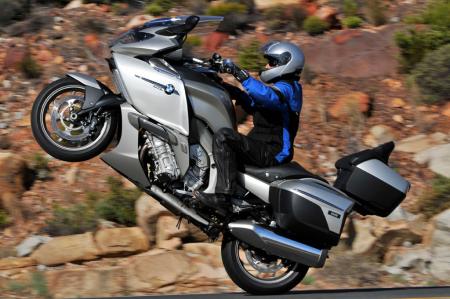 BMW has blown apart what we thought we knew about touring bikes, whether talking about the GTL pictured here or the slightly sportier GT. Gearheads might think they’re worth their $20K-plus price tags solely for the sonic delight trumpeted by the only inline six-cylinder motorcycle engine currently in production BMW has blown apart what we thought we knew about touring bikes, whether talking about the GTL pictured here or the slightly sportier GT. Gearheads might think they’re worth their $20K-plus price tags solely for the sonic delight trumpeted by the only inline six-cylinder motorcycle engine currently in production
|
And yet the mellifluous and powerful engine is just one part of a wonderful touring package, excelling in comfort, handling and a plethora of standard and optional amenities, several of which are unique to the K16s. BMW’s clever and effective look-through-corners adaptive headlight and innovative multi-controller handlebar wheel thoroughly impressed us, and the swing-out wind deflectors in their fairings are gracefully simple yet incredibly effective.
While the GTL isn’t quite as two-up comfortable as the Gold Wing, and the GT is heavier and more expensive than most big sport-tourers, both machines expand the possibilities and capabilities of both categories. And for the GTL to be priced competitively with the Gold Wing is yet another significant accomplishment for the German brand. The K16s are stunning, spectacular, appealing, capable and effective, easily earning a combined place as our Motorcycle of the Year.
Related Reading
Best Of 2010
Best Of 2009
Motorcycle of the Year Honorable Mention
Ducati Diavel
While BMW’s K1600 platform has dramatically expanded the definitions of what touring motorcycles can be, Ducati has absolutely shredded apart the cruiser category with the controversial yet strangely appealing new Diavel. Ducati has stretched open the envelope of what a cruiser can be. “I truly believe that we’re going to open a new market segment,” Ducati CEO Gabriele del Torchio told us at the Diavel’s U.S. debut you can read about here.
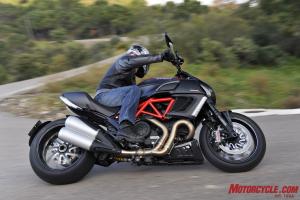 Sport-cruiser? Muscle-cruiser? Stretched Standard? Whatever you choose to call it, there’s nothing on the road like the Ducati Diavel, earning it honorable mention for our bike-of-the-year honors.
Sport-cruiser? Muscle-cruiser? Stretched Standard? Whatever you choose to call it, there’s nothing on the road like the Ducati Diavel, earning it honorable mention for our bike-of-the-year honors.
Compared to any other Ducati, the Diavel’s feet-forward pegs and pull-back handlebar definitely lean toward the cruiser world, and the stretched and slammed package and fat 240mm rear tire makes it the most distinctive Ducati ever. The steamroller tire and relaxed ergo package disguises a surprisingly competent sporting machine, a real asset to aging sport riders who have moved on from the torture-rack layout of bikes like Ducati’s superbike series.
The Diavel (“devil” in Bolognese) is at home in the high-end cruiser realm due to its spectacular fit and finish and attention to detail. Aluminum body panels grace the fuel tank and tailsection, and pillion accommodations are cleverly hidden away, using fold-down footpegs and a grab handle that slides out from its stowed area above the taillight. The back end is cleaned up by using a single-sided swingarm and side-exit exhaust, capped off by a faired-in taillight and LED turnsignal strips. A stylish steel-trellis license plate bracket extends from the swingarm, a custom touch that further cleans up a bodacious rear end.
But most importantly, this is a “cruiser” with exceedingly high performance levels. It’ll look great down at the local café, but it’s just at home on a canyon road or a dragstrip. With 41 degrees of available lean angle, it can dip deeper into corners than the sporty H-D XR1200X, and, at a little less than 500 pounds full of fuel, it weighs less than any 750cc-plus cruiser we can think of. The Diavel’s 1198cc V-Twin produces more than 130 horses at that fat rear meat, enough to propel the low-slung beast to 60 mph quicker than nearly any production motorcycle, just 2.6 seconds according to Cycle World.
The surprisingly likeable Diavel expands the Ducati’s reach while still maintaining its familiar tubular-trellis frame, torquey yet revvy desmo V-Twin and a high-performance sport heritage. The Diavel’s total package is far beyond what we expected, and it has carved out a unique niche in an increasingly crowded market.
Related Reading
2011 Ducati Diavel Review
2011 Ducati Diavel Review (Almost)
Best Sportbike
Suzuki GSX-R750
Last year BMW’s S1000RR won our coveted Best Sportbike award and overall Motorcycle of the Year honors by bringing the digital age of sportbikes to the masses – along with horsepower numbers never before seen from a liter-size engine. In contrast, this year the Suzuki GSX-R750 wins our Best Sportbike award because of its (comparatively) simple package that proved more than enough to win our Middleweight Sportbike Shootout against two other fantastic European sportbikes.
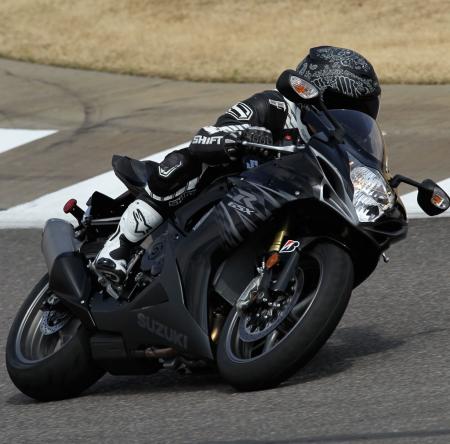 The original GSX-R750 ushered in the modern sportbike paradigm, and Suzuki’s 2011 revamp delivers an amazingly versatile sport machine that strikes a fine balance between a nimble 600 and the brutal speed of a literbike. It reminds us that a 750 might be the ideal sportbike displacement, earning it our award as Best Sportbike of 2011. The original GSX-R750 ushered in the modern sportbike paradigm, and Suzuki’s 2011 revamp delivers an amazingly versatile sport machine that strikes a fine balance between a nimble 600 and the brutal speed of a literbike. It reminds us that a 750 might be the ideal sportbike displacement, earning it our award as Best Sportbike of 2011.
|
While Suzuki could have rested on its laurels and only pay a passing glance to the 750, the company instead insisted on refreshing the motorcycle that virtually created the sportbike category. Engine tweaks compared to the previous model make for more useable power that shames its 600cc little brother, and with nearly 121 horses at the rider’s command, there’s plenty of ponies to keep even the most seasoned riders giggling under their helmets. Combine that with an unflappable, ultra-linear chassis, impressive Showa Big Piston Fork, powerful Brembo monobloc brakes, two useful ride modes, and that unmistakable Suzuki familiarity, and it’s a balanced combination for success.
Perhaps the biggest reason why we named the GSX-R750 Best Sportbike is its strong value. Getting a world-class sportbike that’s versatile enough for an all-day street ride and capable enough to set lap records at the track, all for $11,999, makes it a winner in our books.
Related Reading
2011 Middleweight Sportbike Shootout — Track
2011 Middleweight Sportbike Shootout — Street
2011 Suzuki GSX-R750 Review
2011 Suzuki GSX-R600 and GSX-R750 Revealed
Best Sportbike Honorable Mention
BMW S1000RR
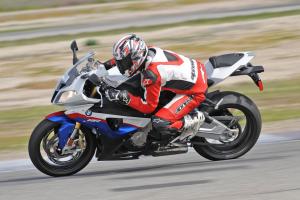 The S1000RR is so good that we had to have it back in our Best Sportbike category somehow. Honorable Mention seems appropriate.
The S1000RR is so good that we had to have it back in our Best Sportbike category somehow. Honorable Mention seems appropriate.
Despite new literbike challengers introduced this year to unseat the Beemer (namely the Kawasaki ZX-10R), none have succeeded. At least none we’ve ridden (alas, the Aprilia RSV4 Factory APRC looks like a solid contender, but as of press time we have yet to ride one). Granted, the Kawi came awfully close when the two squared off against each other but there was no denying the BMW’s 23 horsepower advantage in a mostly dead-even heat.
Think about this for a second: the S1000RR makes 180 horses at the rear wheel – bone stock. That’s more than what full-factory (750cc) superbikes from just a decade ago were making with every go-fast bit in every catalog available, not to mention much more torque. Combine that engine with one of the most sophisticated electronics packages available, and you have the kind of boundary-pushing performance that makes us drool. All for 16-large.
We can’t discredit the job Suzuki has done to refresh one of the most iconic motorcycles in the genre, with the supremely balanced GSX-R750 able to thrill with every ride yet not overwhelm. However. we can’t blame you if you think the S1000RR should’ve taken this award two years running.
Related Reading
2011 Kawasaki ZX-10R vs. 2011 BMW S1000RR Track Shootout
2011 Kawasaki ZX-10R vs. 2011 BMW S1000RR Street Shootout
2010 BMW S1000RR Review
2010 Literbike Shootout: RSV4 R vs. S1000RR vs. CBR1000RR vs. ZX-10R
Best Standard
Triumph Speed Triple
From the moment we first rode the revamped 2011 Triumph Speed Triple at its introduction in Southern California and came back beaming, we knew it was going to be a contender for the Best Standard bike this year. Then, in our Literbike Streetfighter Shootout all doubts were erased as the new Speed Triple brought out the inner hooligan in all of us. We’ve been big fans of the previous Speed Triple and were skeptical when we learned that it was being revamped, but the lighter, more powerful and more compact new bike delivers even bigger grins than before.
 When riding the new Triumph Speed Triple, this will inevitably be what you end up doing with it. It’s hard not to. When riding the new Triumph Speed Triple, this will inevitably be what you end up doing with it. It’s hard not to.
|
Thankfully, Triumph made one of our favorite engines even better with relatively simple tweaks. The result is a mill that puts out around 120 horses and 120 horses and 75 ft.-lbs. of torque with even greater useable power and a supremely melodic tune at full throttle. Combined with even sharper chassis geometry and brutally powerful Brembo brakes, the S3 feels right at home at the racetrack, a gnarly canyon, a long stretch of the freeway or even an abandoned parking lot. You know, to practice the wheelies and stoppies that you’ll inevitably want to do. At $11,799, it’s not the most affordable naked bike out there, but one twist of the throttle will justify its cost. Now, about those headlights…
Related Reading
2011 Literbike Streetfighter Shootout
2011 Triumph Speed Triple 1050 Review
Best Standard Honorable Mention
Honda CB1000R
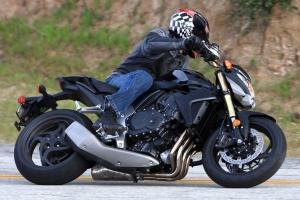 Thank you, Honda, for bringing the UJM back to the masses with the CB1000R. It’s every bit a modern interpretation of Honda’s iconic CBs from the past.
Thank you, Honda, for bringing the UJM back to the masses with the CB1000R. It’s every bit a modern interpretation of Honda’s iconic CBs from the past.
Honda’s new CB1000R was outgunned and out-menaced during our Literbike Streetfighter Shootout against Triumph’s new Speed Triple and Kawasaki’s muscular Z1000, but that detracts from what is a wonderfully sweet naked streetbike. We were enamored by the mild-mannered, user-friendly nature of the CB, but it didn’t quite cut it in the raw and edgy streetfighter realm. But when judging the CB on its intended use as a versatile streetbike, it’s hard to deny it deserves an Honorable Mention as one of the best Standard motorcycles we’ve ridden this year.
We should consider ourselves lucky to have the CB1000R at all, as Honda execs almost kept it off our shores. Powered by a version of the previous generation CBR1000RR engine (pre-2008), we enjoyed twisting the throttle to experience the abundance of torque from this retuned mill. Upright ergos make it comfortable when riding long distances or cutting through commuter traffic, and an ultra-responsive chassis reveals agility unheard of from a 1000cc motorcycle.
We’re fans of the Universal Japanese Motorcycle, and the CB1000R is a throwback to the UJMs of old. In a day and age where most motorcycles are ultra-specialized, we appreciate riding an adaptable, modern-day UJM like the CB. Unfortunately, when introduced at the same time as the updated Speed Triple, it was bound to play second fiddle in this broad class.
Related Reading
2011 Literbike Streetfighter Shootout
2011 Honda CB1000R Review
Best Cruiser
Ducati Diavel
Classifying Ducati’s indefinable Diavel as a cruiser is borderline sacrilegious. The only qualities that hedge this mad machine ever so slightly in the cruiser direction are its relaxed riding position, a monster 240mm rear tire, and unusually-long-for-a-Duc 62.6-inch wheelbase.
We can’t think of a modern production-level cruiser that can hold a candle to the Diavel’s unrivaled combination of power, handling, stopping force, comparatively light weight and rider comfort. Premium-level components are wrapped around Ducati’s trademark steel-tube trellis frame (mated to a new cast-aluminum subframe) cradling the source of the Diavel’s raucous heart – a Multistrada-based 1198.4cc 90-degree Twin rated at 162 crankshaft horsepower (a little more than 130 hp at the back wheel).
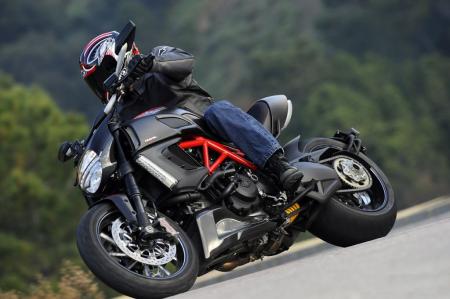 Caption: Ducati has artfully married the egocentric ethos driving one-off custom cruiser styling with cutting-edge sportbike tech and performance. The Diavel is just the “cruiser” we’d expect from multi-time World Superbike champion Ducati. Caption: Ducati has artfully married the egocentric ethos driving one-off custom cruiser styling with cutting-edge sportbike tech and performance. The Diavel is just the “cruiser” we’d expect from multi-time World Superbike champion Ducati.
|
Ducati ABS works in conjunction with a brilliant set of Brembo radial-mount monobloc calipers. Eight-level rider-selectable DTC (Ducati Traction Control) complements the Sport, Touring and Urban rider-selectable fuel-mappings – all displayed in a color TFT screen.
The Diavel was up as a strong nomination for 2011 Bike of the Year. Regrettably, the Diavel’s 240mm rear tire brings with it inherent impedances to predictable, linear slow-speed handling. Beyond this minor fat-tired drawback, what you need to know is that the Diavel is like no other motorcycle available today, let alone another cruiser.
There’s no denying the raw power of the recently redesigned Yamaha VMax. However, despite Mad Max’s claims of nearly 200 hp, the revitalized one-time flagship Yamahauler gives up around 175 pounds to the Diavel – not to mention all the sophisticated rider electronic aids and trustworthy handling.
Related Reading
2011 Ducati Diavel Review
2011 Ducati Diavel Review (Almost)
2010 Triumph Rocket III Roadster vs. 2010 Star VMax
Best Cruiser Honorable Mention
Triumph Thunderbird Storm
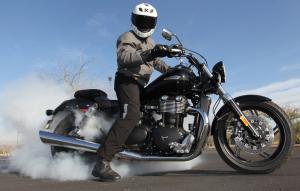 We like destroying rear tires as much as the next guy. We especially like to do them on boulevard bruisers like the Triumph Thunderbird Storm. Sinister looks with the increased performance to back it up put it at the pointy end of the list in the Best Cruiser category.
We like destroying rear tires as much as the next guy. We especially like to do them on boulevard bruisers like the Triumph Thunderbird Storm. Sinister looks with the increased performance to back it up put it at the pointy end of the list in the Best Cruiser category.
The Brits have really taken to the cruiser market, offering their own distinct style in a collection of me-too boulevardiers. Adopting the “No replacement for displacement” motto, the company introduced the 2300cc Rocket III and made a statement. As if wanting to tone down the aggressiveness a bit, the 1600cc Thunderbird became a mellower gentleman’s cruiser that had competitive power and sportier handling than most cruisers, earning it our Best Cruiser award in 2009.
Now Triumph is reverting back to that tough-guy image with the Thunderbird Storm, and the competition should be afraid. Most of the chrome is ditched for black, and the parallel-Twin engine gets a 100cc boost to 1700cc. Compared to the standard Thunderbird, the Storm gets 12 more horses (97 vs 85) and 7 more ft.-lbs. of torque (115 vs. 108), a power increase easily felt in the saddle. All told, the T-Bird Storm delivers a swift kick in the pants when the throttle is whacked open, with a sound that’s distinctly aggressive yet clearly not a V-Twin and is altogether marvelous.
For a cruiser, the Storm is a decent handler, too. Ground clearance is surprisingly high and direction changes aren’t very taxing. Combined with its strong brakes, the Storm actually parades with shades of a sporting pretense, which is all the more impressive for this boulevard bruiser.
Last year we wanted to give credit to the Thunderbird, but only mentioned it in passing when granting the Rocket III Honorable Mention. This year, with its complete attitude adjustment and bigger muscles, the Thunderbird has again found its time to shine.
Related Reading
2011 Triumph Thunderbird Storm Review
Best Touring
BMW K1600GTL
With the introduction of the K1600GTL BMW upped the ante and redefined what a touring bike can be. For purists, the GTL’s combination of light weight and high horsepower dispels the notion that a touring bike loaded with all the bells and whistles can’t hustle down a twisty two-laner with aplomb. It’s six-cylinder engine (there’s just something about an inline-Six…), is compact, powerful and a marvel of modern engineering. BMW formulated an exhaust system to let this new engine sing, and the result is music to the ears of anyone who appreciates internal combustion.
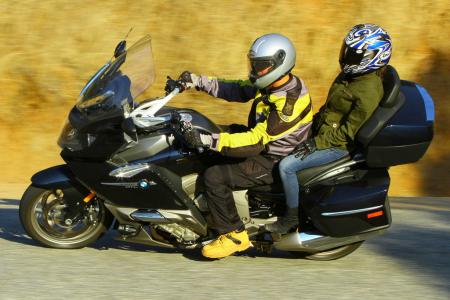 By equipping the K1600GTL with an awesome inline six-cylinder engine and keeping its weight relatively low, BMW sets a new standard in the realm of plush touring bikes. By equipping the K1600GTL with an awesome inline six-cylinder engine and keeping its weight relatively low, BMW sets a new standard in the realm of plush touring bikes.
|
BMW also gifted the GTL with an array of electrical gizmos including Electronic Suspension Adjustment, engine mode selection, GPS and an electrically adjustable windscreen. To access and control these functions as well as the XM radio, seat and handgrips heater, etc., BMW devised the left-handlebar-mounted multi-controller. By combining the multitude of electronic functions and ridding the bike of various buttons, dials and switches, BMW simplified the operation into something that, once learned, is non-distracting and easy to operate.
Like we said in our luxo-touring shootout, the K1600 didn’t necessarily defeat the Honda as Best Touring Bike, it enriched the options from which touring bike enthusiasts have to choose.
Related Reading
2012 BMW K1600GTL vs. 2012 Gold Wing Shootout
2012 BMW K1600GTL Review [Video]
2012 BMW K1600GT and GTL Six-Cylinder Unveiled
Best Touring Honorable Mention
Honda Gold Wing
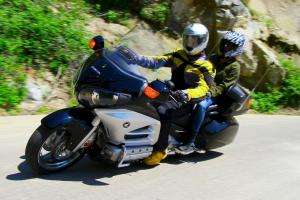 The career of the Honda Gold Wing mirrors that of Valentino Rossi: If it’s not winning the title, it’s usually a close second.
The career of the Honda Gold Wing mirrors that of Valentino Rossi: If it’s not winning the title, it’s usually a close second.
Honda saw the writing on the wall with the emergence of the BMW K1600GTL, and it retaliated with a revised, early-release 2012 Wing as a stop-gap measure to BMW’s luxo-touring offensive. The 2012 model Gold Wing features larger and more stylish saddlebags, revised suspension, new seat material, iPod connectivity, surround sound audio, updated GPS navigation system and redesigned side fairings.
The Wing is the best two-wheel touring rig when traveling long distances in a straight line and remains the most comfortable luxo bike for two people. For its size and weight the Gold Wing is surprisingly agile, while its horizontally opposed six-cylinder engine produces stump-pulling torque. The Wing also boasts better protection from the elements and the more storage capacity than this year’s class winner.
Related Reading
2012 Honda Gold Wing Review – First Ride
2012 Honda Gold Wing Review [Video]
2012 Honda Gold Wing Unveiled
Best Sport-Tourer
BMW K1600GT
While we generally prefer a sport-touring bike to weigh less than 700 pounds, we were swayed this year by the amazingly comfortable yet startlingly sporty K1600GT. Never before has a motorcycle so coddled its rider while tearing up a twisty road.
The GT’s cockpit is a splendid place to watch the miles pile on. A broad seat provides long-range support and heat, too, if desired. Comfortably placed grips also emit heat, and a magical wheel on the left handlebar makes navigating through multifarious accessory controls simple. The right bar carries cruise control, a very convenient tool missing from most other sport-tourers, and the same can be said about its optional audio system. An electrically operated windscreen varies the coverage from “just enough” to “Am I in a convertible?”
|
|
But then, when the road gets curvy, the GT transforms into a Gixxer 1600. Turn-in response is incredibly quick for a touring sled of its size, and ample ground clearance allows corner speeds that will embarrass modestly ridden sportbikes, especially with the optional Electronic Suspension Adjustment set on Sport at the touch of a button. The fabulous inline-Six (pleasingly louder than its GTL brother) catapults the big rig with an effortless surge forward and a glorious exhaust note.
The K1600GT is the Gold Wing that retiring track addicts would hope for. It’s an exceptional sport-touring machine that, after just one ride, will have you scheming up a way to afford its $21K asking price.
Related Reading
2012 BMW K1600GT vs. 2011 Kawasaki Concours 14
2012 BMW K1600GT Review
Best Sport-Touring Honorable Mention
Suzuki GSX1250FA
 The big sport-touring GSX1250FA lost the Bandit moniker, gained some fairing, and won us over for its blend of functionality and affordability.
The big sport-touring GSX1250FA lost the Bandit moniker, gained some fairing, and won us over for its blend of functionality and affordability.
If we were to create a “Sleeper of the Year” category, Suzuki’s GSX1250FA would be the winner. This easily overlooked motorcycle impressed us with its ability to deliver a modern motorcycling experience in an old-school package. With a retail price of $11,600, including ABS, the GSX is the bargain of the realm of sport-touring models. The 1255cc engine isn’t brutally powerful, but does produce 72.3 lb.-ft. of torque at just 3,500 rpm that will accelerate the 567-pound bike out of corners better than many models with more peak power.
In stock trim the GSX is more of a fully faired sporty standard, but the Suzuki can be outfitted as a sport-tourer via factory accessories like detachable saddlebags (and/or a top box) and a fuller-coverage windscreen that tips the GSX further to the touring side. Even with these additions the GSX1250 remains a bargain, especially compared this year’s Best Sport-Tourer category winner. Low on flash but big on value, the GSX deserves attention from practical sport and sport-touring riders.
Related Reading
2011 Suzuki GSX1250FA Review
2011 Gentlemen Sportbike Shootout
Best On/Off-Road
2011 Triumph Tiger 800XC
The Triumph Tiger 800XC won this category and its shootout with the BMW F800GS, last year’s category winner, by the narrowest of margins. The Beemer remains the better off-road bike, but the smooth and capable three-cylinder engine powering the Tiger is the ingredient that made it the a better all-around package. The Tiger proved itself almost as capable as the BMW in the dirt, and it accomplished the grind of commuting with more verve.
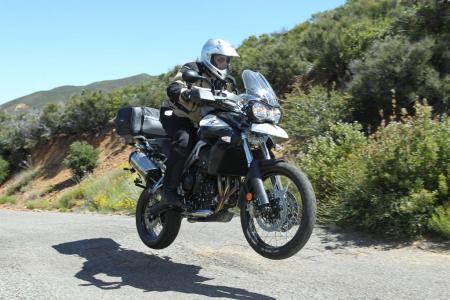 The new Tiger 800XC gives up a little bit to the F800GS in the dirt, but it’s the better overall package for the variety of duties we use our motorcycles for. And it can be had for less money than the Beemer. The new Tiger 800XC gives up a little bit to the F800GS in the dirt, but it’s the better overall package for the variety of duties we use our motorcycles for. And it can be had for less money than the Beemer.
|
On the pavement the Tiger’s advantage over the BMW is greater than the BMW’s over the Tiger in the dirt. The Tiger’s combination of smooth, powerful engine and comfortable ergonomics proved more important during the long hours pounding out freeway miles and, more particularly, in the canyons where the Tiger’s pleasing Triple makes connecting apexes a thrilling experience.
We could’ve chosen from several dirt-worthier dual-sport machines, but so many of the miles most of us travel are on paved roads. For adventure-touring use, the 800cc bikes strike us as the best compromise. This year, it’s the Tiger that comes out on top.
Related Reading
2011 Adventure-Touring Shootout: Triumph Tiger 800XC vs. BMW F800GS
2011 Triumph Tiger 800 & 800XC Review
2010 Triumph Tiger SE vs. 2008 Benelli Tre1130K
Best On/Off-Road Honorable Mention
2011 BMW F800GS
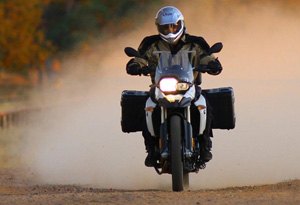 When the going gets dirty, the BMW F800GS asserts itself as best A-T bike by leaving the competition in the dust.
When the going gets dirty, the BMW F800GS asserts itself as best A-T bike by leaving the competition in the dust.
The F800GS won this category the last two years running, and it was only by a condom’s thickness that it lost this year. The Beemer remains the best adventure-tourer in the dirt, but the new Tiger 800XC is nipping at its rear tire and proved the better all-around package for 2011.
Where the BMW shines is in its feeling of less weight, which makes it a more confidence-inspiring ride when dirt is involved. And the GS shows BMW’s considerable development skills in its size-adjustable saddlebags durable enough for off-road riding and its easy on/off ABS selection. But its rougher engine and higher MSRP puts it a peg below the new Tiger.
Related Reading
2010 BMW F800GS Review
2010 BMW R1200GS and GS Adventure Review
Best Value
Honda CBR250R ABS
When Honda stopped importing the VTR250 in 1990, it left the Kawasaki Ninja 250 as the default entry-level sportbike, remaining that way for two decades. But with the introduction of the CBR250R, Honda removed the best quarter-liter sportbike trophy from Kawasaki’s mantle. Boasting an MSRP of $3,999, equal to that of the Ninja, and only a $500 bump in price for ABS, the newest CBR easily won our best-bang-for-your-buck award this year.
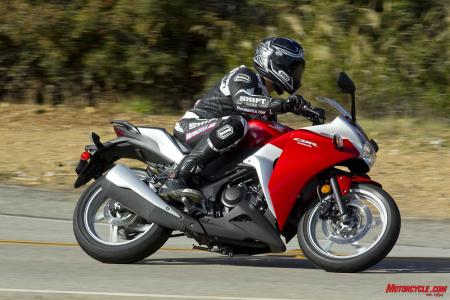 The Honda CBR250R unseated the long-standing Ninja 250 as the best entry-level sportbike, and its $500 ABS option makes it even more appealing to budding riders. The Honda CBR250R unseated the long-standing Ninja 250 as the best entry-level sportbike, and its $500 ABS option makes it even more appealing to budding riders.
|
The liquid-cooled, fuel-injected single-cylinder engine powering the CBR makes more usable power than the Ninja’s peaky parallel-Twin and is remarkably smooth. The new CBR is also the first small-displacement sportbike to offer ABS, and this is a feature that’s worth every penny for beginner riders. Honda’s Combined-ABS links the rear brake with one of the front caliper’s three pistons, and if pushed past the ABS threshold, hauls the bike down with the usual mild pulsing. Nicely styled, comfortable for a variety of sizes and shapes, and affordable in new-bike terms, the CBR250R ABS is a winning combination at a great price for beginner riders – or experienced ones.
Related Reading
2011 Honda CBR250R
2011 Honda CBR250R Tech Review
2011 Honda CBR250R Review
Best Value Honorable Mention
2011 Ninja 1000
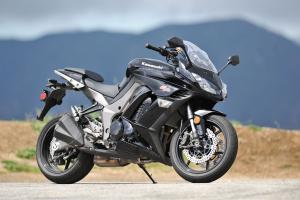 The Ninja 1000 offers a blend of performance, versatility, comfort and style unmatched anywhere else for $11,000.
The Ninja 1000 offers a blend of performance, versatility, comfort and style unmatched anywhere else for $11,000.
The Kawasaki Ninja 1000 kept us comfortable, thrilled and smiling, whether during its single-bike testing or when pitted against competing models of similar attributes. A monster motor with real-world
streetable power gives this gentleman’s Ninja a level of competency more specialized sportbikes lack. Unlike bigger, heavier sport-tourers, the Ninja 1000 maintains light and flickable handling with ergonomics that are comfortable but still reasonably aggressive.
With its $10,999 MSRP, the Kawasaki Ninja 1000 packs a lot of value into a high-performing yet versatile package. It’s comfortable and responsive during commuter duties, and yet it’s capable of swiftly inhaling a twisty canyon road and wouldn’t feel out of place at a trackday. Its clever manually adjustable windscreen makes the air do your bidding when bombing down a lonely highway, and its pillion accommodations are much more generous than any pure-sport literbike. It’s a terrific, multitalented sportbike that seems perfectly timed for motorcycling’s aging-yet-sporting demographic looking for big bangs from their bucks.
Related Reading
2011 Kawasaki Ninja 1000 Review – First Ride
The Best Literbike for the Street
2011 Gentlemen Sportbike Shootout
Best Electric
Zero Motorcycles
This category win is more about the company and brand Zero rather than one specific model from the the Scotts Valley, Calif.-based company. It has thoroughly revamped its product line for 2011 and continues to innovate using existing technology and developing a domestic dealer network.
Brammo’s recent announcement of the first multi-speed transmission for an electric motorcycle reveals it to be a forward-thinking company, but it has failed to keep pace with the practical implementation of ever-evolving e-bike technology in production versions. Zero, on the other hand, has crafted not only one new model (a price-conscious derivative of an existing model) this year, but added layers of refinement to existing product.
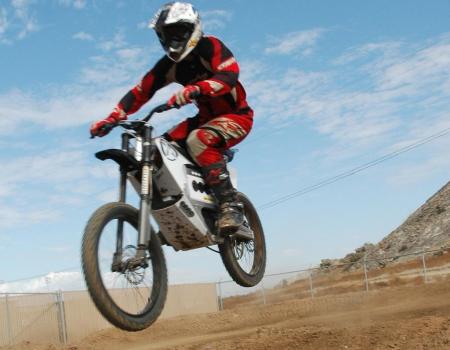 It was back in 2008 when we enlisted ex-AMA champ Mickey Dymond to test one of Zero’s earliest bikes, the X. It’s only been a handful of years since e-bikes burst onto the mainstream, but with advanced technology, the electric motorcycle scene gets updated as often as personal computers. It was back in 2008 when we enlisted ex-AMA champ Mickey Dymond to test one of Zero’s earliest bikes, the X. It’s only been a handful of years since e-bikes burst onto the mainstream, but with advanced technology, the electric motorcycle scene gets updated as often as personal computers.
|
A multitude of improvements across its product line for 2011 shows Zero is enjoying the benefits of an enlarged R&D team that includes former Buell engineers. This year, a new belt-drive system replaces a noisy chain, braking performance is greatly improved, and suspension components receive much-needed upgrades. The Zero XU, a new model for 2011, is something of a price-conscious iteration of the Zero S.
We like Brammo’s ambitious plans, but Zero seems better focused on getting its improved product in the hands of consumers a lot sooner than any other electric motorcycle maker to date.
Related Reading
2011 Zero XU Review
Zero Motorcycles Launches Dealer Network
2011 Zero Electric Motorcycles Launch
2010 Electric Motorcycle Shootout
Dual-Sport Shootout: Electric vs. Gasoline!
2010 Zero DS Review
2010 Zero S and DS Review
2010 Zero MX Review
2008 Zero X Review
Best Electric Honorable Mention
Brammo
If promises were all it took to earn awards, Brammo would be leading the electric motorcycle charge. The Oregon-based company shocked the e-bike world with its announcement last summer of the high-performance Empulse. It is purported to be a 100/100 machine, meaning that it can achieve a top speed of 100 mph and have a workable range of 100 miles on a single charge (but not at a constant 100-mph). However, despite promises of a first-half 2011 production date, customers with deposits still haven’t seen the bike while it undergoes further development.
And in May 2011 Brammo announced four new models that will employ a six-speed transmission. This is seen as a big leap toward wooing enthusiasts of internal-combustion-powered motorcycles since electric motor-driven motorcycles currently do not require a manual transmission to propel a bike down the road.
The upcoming technology from Brammo promises to be the next leaps forward in electric motorcycles, but the company has thus far been long on promises and short on delivery. Brammo’s next 12 months will be telling. Until then, the class-leading Enertia carries the torch.
Related Reading
2011 Brammo Empulse Preview
2010 Brammo Enertia Review
Electric Motorcycles Primer
Best Scooter
Genuine Stella 4-Stroke
You’d be forgiven if you mistake our Scooter of the Year for a classic Vespa PX. The vintage-styled Genuine Stella 4-Stroke is produced by Piaggio’s former Indian partner, LML, and though that partnership ended in 1999, the Stella and PX still have a lot in common.
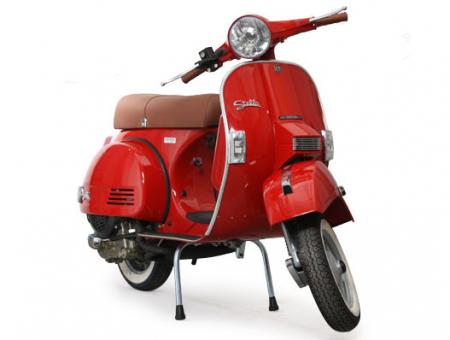 |
The Stella has been available for a couple of years now, but it’s new to California thanks to the 2011 model’s 148cc four-stroke engine. Other features include front disc brakes, halogen headlights, and an eye-popping claimed fuel economy of 140 mpg. And unlike most modern scooters on the road, the Stella uses a four-speed “twist-grip” manual transmission similar to vintage Vespas and Lambrettas. Other classic touches include the stamped-steel monocoque body and a spare tire under the left side cover. At $3599, the Genuine Stella 4-Stroke is also more affordable than a 150cc Vespa.
Best Scooter Honorable Mention
Kymco People GTi 300
Last year, Kymco took our Scooter of the Year honors, and the Taiwanese manufacturer almost did it again with its new 2012 People GTi 300. The GTi 300’s new fuel-injected four-stroke engine is a notable upgrade over the carbureted 250cc engine found on the People S it replaces. Other features include 16-inch wheels, front and rear disc brakes and surprisingly peppy acceleration.
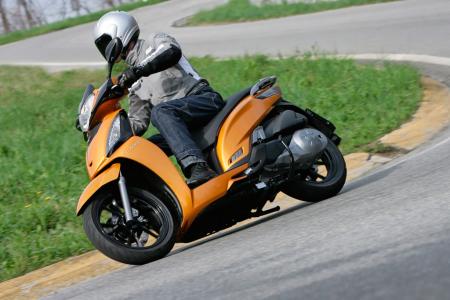 |
Related Reading
2012 Kymco Scooter Lineup Review
Best Dirtbike
2011 Kawasaki KX250F
Our experience with the newly released 2012 dirtbike models was quite limited at press time, so these selections are based on models we’ve tested extensively to this point in the year. –Ed.
What more can we say about the powerhouse of the 250F class? We’d race it anytime, anywhere. The KX250F never does anything terribly wrong, and its amazing engine more than makes up for its few rough edges and mid-pack handling. The new SFF fork is supremely adjustable, the ergonomics are refined, and the controls work great.
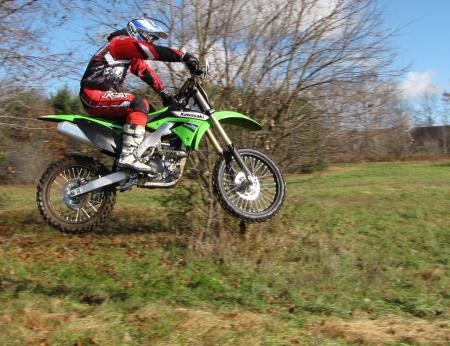 |
We first fell in love with the carbureted KX250F back in 2010, and then we fell even more in love with the new fuel-injected model. Our respect for the 2011 KX250F continued to grow when racing it in the woods this spring. The KX250F has become the race bike all of our other test bikes are judged by, regardless of displacement. The 2011 KX250F is versatile enough to race anywhere. It’s solidly built and, most of all, it’s fast. Really, really fast!
Best Dirtbike Honorable Mention
2011 Honda CRF250R
It was hard to give the CRF250R second place. We had a riot testing this motorcycle on everything from supercross-inspired motocross tracks to old-school European-style grass tracks to cross-country courses to Endurocross-type obstacles.
This is a very forgiving and confidence-inspiring motorcycle, with top-rate ergonomics and handling. The engine, though not as strong overall as some other 250Fs, has the most usable ‘real world’ powerband this side of an XR200, making it equally happy in play-bike mode as it is at a racetrack.
One of our Pro test riders liked the 2011 Honda CRF250R so much he bought one to use for XC, Endurocross and Enduro racing, and he recently finished fourth in the Pro class at a local ‘Extreme’ enduro on his bone-stock CRF250R.
Best New Technology
BMW Adaptive Headlight
Products or things meant to enhance safety usually aren’t fun or cool. Then came along BMW’s adaptive headlight for the K16 GTL/GT uber-tourers.
It shouldn’t have taken you more than your first nighttime trip on two wheels to realize how difficult it is to see through the entirety of turn, especially when it’s poorly illuminated (or not lit whatsoever!). As we learned in our first look at the new K bikes, the purpose of the adaptive light technology is to keep the headlight beam directed in the bike’s path, even when leaned over in a corner.
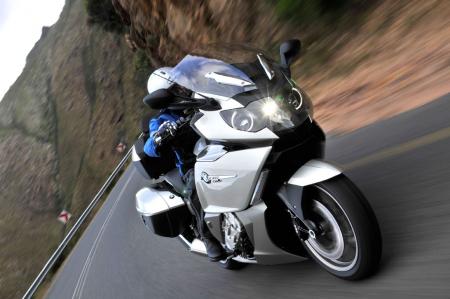 BMW’s adaptive headlight isn’t just one of the best things to happen to conventional motorcycle light technology, it’s one of the best things in recent years to happen to motorcycling altogether. BMW’s adaptive headlight isn’t just one of the best things to happen to conventional motorcycle light technology, it’s one of the best things in recent years to happen to motorcycling altogether.
|
A stepper motor operates a mirror inside the headlight assembly, pivoting the mirror to the left and right of the standard-equipment Xenon bulb. The mirror directs the light’s beam along the motorcycle’s intended path when the bike leans for cornering. Amazingly, the headlight shines ahead, through the corner! It works as advertised and is a brilliant device (pun intended). If we were to purchase a new K16, the Adaptive Headlight is a must-have feature for us.
Although the premise behind the purpose of this light is simple, there’s nothing like seeing it in action. Watch a video simulation of the adaptive headlight in our BMW K1600GT / K1600GTL preview news item.
Related Reading
2012 BMW K1600GT vs. Kawasaki Concours 14 ABS
2012 BMW K1600GTL vs. Honda Gold Wing Shootout
2012 BMW K1600GTL Review
2012 BMW K1600GT Review
2012 BMW K1600GT and GTL Six-Cylinder Unveiled
Best New Technology Honorable Mention
BMW K1600GT/GTL Multi-Controller
 The multi-controller scroll wheel (black/gray dial) works in conjunction with the Menu button for quick, easy access to the numerous menu options within the K16’s on-board computer.
The multi-controller scroll wheel (black/gray dial) works in conjunction with the Menu button for quick, easy access to the numerous menu options within the K16’s on-board computer.
Just as BMW’s adaptive headlight is more sensible than sexy (unlike the alluring exhaust note emanating from the six-cylinder K bikes’ dual exhaust!) so is BMW’s new multi-controller, found as standard equipment on the K1600s and first seen on the 2010 R1200RT. But just as the new headlight is a genuine asset for improving riding safety, the multi-controller scroll wheel also creates an avenue or two for allowing a rider to remain focused on the road ahead rather than fiddling with a multitude of buttons and switches in the cockpit.
Similar in principle to the iDrive found in BMW’s automobiles, the M-C wheel provides one or two simple moves – rather than pushing various buttons or toggles – to access the numerous menu options in the K bikes’ on-board TFT computer display. Roll the wheel forward or back to view items within a specific menu option, and then push the wheel right or left to select or deselect options, or to access submenus. From operating the sound system to making changes to the electronic suspension (ESA II), the multi-controller is your one-stop device.
Given some time – perhaps less than an hour – to acclimate to the multi-controller and you’ll discover how much more efficient it is than traditional pushbuttons. And when the sequence of selections within a menu is familiar, you can simply manipulate the wheel without ever taking your eyes off the road. A good example of this is changing radio volume or stations.
The one drawback we found is that unless you’re in any menu option other than the radio/sound system you cannot adjust volume – but in a pinch quickly pressing the On button on the fairing’s left panel serves as a mute feature without entirely shutting off the system.
BMW ingenuity wins the day – again!
Related Reading
2012 BMW K1600GT vs. Kawasaki Concours 14 ABS
2012 BMW K1600GTL vs. Honda Gold Wing Shootout
2012 BMW K1600GTL Review
2012 BMW K1600GT Review
2012 BMW K1600GT and GTL Six-Cylinder Unveiled
Best New Product
Cardo Scala Rider G4 PowerSet
Our annual ride to and from Laguna Seca for the GP race doubles as a testing ground for bike shootouts. Multiple editors riding multiple bikes, photographers, videographers all traveling long distances is a prime opportunity for disorganization and misunderstandings. This year, however, our helmets were graced with Cardo’s G4 PowerSet communication system, and what a difference it made. Discussing the route en route, pitstops, lunch stops and Troy falling behind in traffic was significantly easier with Bluetooth communication.
While most Bluetooth comm systems can wirelessly link up two riders, the Cardo G4s can connect as many as four. Officially, the G4 provides three-way communication with Rider 1 paired with Rider 2 on Channel A and paired with Rider 3 on Channel B. In this configuration, Cardo claims a 1-mile range between riders, which we verified on our trip as long as riders were in sight of each other.
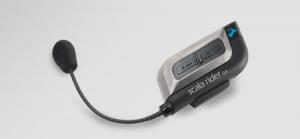 Wireless communication systems have come a long way since first being introduced years ago, and the Bluetooth Cardo G4 is the epitome of this technological progress.
Wireless communication systems have come a long way since first being introduced years ago, and the Bluetooth Cardo G4 is the epitome of this technological progress.
The system can be tricked into linking four riders by Rider 1 pairing with Rider 2 on Channel A and pairing with Rider 3 on Channel B, while Rider 3 is paired to Rider 4 on Channel A and paired to Rider 2 on Channel B. This way Rider 1 and Rider 4 can communicate with each other via the paired connection between Riders 2 and 3. This configuration is intended to serve a pair of two-up riders, so its range is said to be only 35 feet, but we remained linked up at far greater distances.
If, however, the distance from the lead or clean-up rider became too great (especially if there are transmission-intercepting obstacles such as the inlets of the Big Sur coastline) the links between PowerSets can break. It’s a simple matter of pressing the “A” and “B” buttons to re-establish all four links after getting back in range.
The included microphone and noise-suppression system do an excellent job of keeping wind noise to a minimum unless you’re wearing an open face or dirtbike helmet that allows a lot more wind inside the helmet than the average streetbike helmet.
Not just a communication rig, the G4 can also be linked up wirelessly to a mobile phone and a BT MP3 player. Simply pair the G4 with your Bluetooth devices and you’re listening to your favorite tunes or receiving phone calls that you’d otherwise miss while out on the road. Easy to install, light weight and fun, the G4 elevates the motorcycling experience between you and your passenger or riding buddies. After using the system for our week away at Laguna Seca, we were sold on the benefits of the G4 PowerSet. Look for a full review of the $489.99 system in the coming weeks..
Related Reading
Scala Rider G4 Ver. 3 Upgrade Available
MotoGP Racers Get Cardo G4 PowerSet Systems
Cardo Scala Rider Q2 Bluetooth Communicator Review
Best New Product Honorable Mention
Shorai LFX Battery
Battery technology has taken a leap forward with the introduction of lithium cells, and the Shorai LFX demonstrates what the future holds. The LFX is just one-fifth the weight of a lead-acid battery, thanks to its new technology (“the world’s only prismatic lithium-iron battery”) and carbon-fiber-composite case, and it’s at least half the size of your old battery.
We’re currently testing the LFX18A1-BS12 in a recalcitrant early-’90s Ducati Supersport, and it’s really impressed us so far. It not only shaves more weight (about 7 pounds) than an acre of carbon fiber, it also cranks the old V-Twin faster than any other battery we’ve tried. This rarely ridden Duc is putting Shorai’s claims of holding a charge without maintenance (for up to one year!) and its purported increase of service life of two to four times compared to a lead-acid battery. Thus far, the Shorai LFX is by far the best battery sampled by the old Duc, which has eaten many lesser batteries. Look for a full review next month, but so far we think the LFX18A1 is well worth its $187 asking price. Shorai LFX run from $99.95 to $349.95, in Ah-equivalent sizes from 7Ah to 36Ah.
The post Church of MO: Best Of 2011 Awards appeared first on Motorcycle.com.
Copyright
© Motorcycle.com


